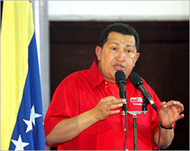Untitled Document
 |
Chavez has promoted Telesur
as alternative to US media outlets |
The new Venezuela-backed Latin American TV station Telesur is considering
a possible alliance with Aljazeera.
Telesur president Andres Izarra announced the possibility on Wednesday as he
confirmed he would step down as Venezuela's information minister to head the
recently created Latin channel, which President Hugo Chavez has promoted as
an alternative to US media outlets like CNN.
"There is a possibility of reaching an agreement with Aljazeera, but our
interest, more than anything, is in looking for greater diversity and deeper
views on subjects," Izarra said at a news conference.
He said a proposed "strategic alliance" with Aljazeera would be just
like those with other international news agencies, and would aim to "search
for more material, to seek a deepening of information that we wouldn't obtain
otherwise".
Izarra said Aljazeera's thorough coverage of the Middle East could be an asset
if shared with Telesur. He also said Aljazeera's plans for an English-language
news channel would greatly enhance news distribution.
Regular broadcasts
Telesur - which has no regular commercials and is also backed by Argentina, Uruguay
and Cuba - began regular broadcasts on Sunday, transmitting news, documentaries
and other programmes to various countries across Latin America.
The station has drawn concern in the US Congress, where House members last
week approved a measure to transmit radio and television broadcasts if necessary
as a
counterbalance to any anti-American messages.
Chavez, an outspoken critic of the US government and a close friend of Cuban
leader Fidel Castro, regularly criticises US "imperialism". But organisers
of Telesur deny the channel will be a mouthpiece for Chavez and say it will
support critical, independent journalism.
Izarra's announcement that he would step down as information minister came
after a station board member, English novelist and filmmaker Tariq Ali, said
publicly that for the station to be truly effective it would need to be entirely
independent.
"Once it was on the air, it was necessary to remove any direct influence
of the Venezuelan government over the channel, in order to guarantee that it
complies with its aims and ethical standards," Izarra said.

